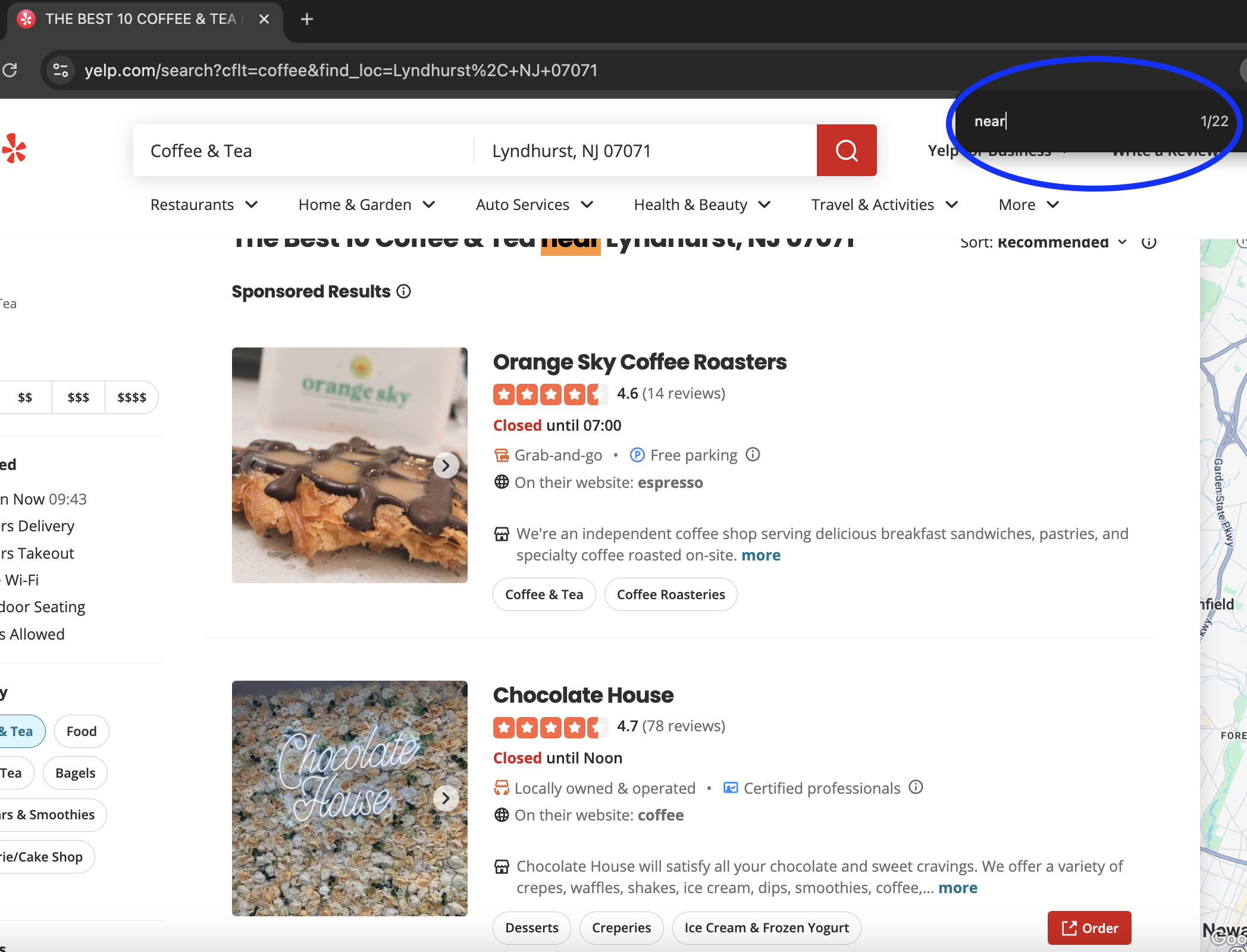Small business owners will know that the reality of running a business also involves being the head of finance, chief marketer, operations lead, and every other role you never knew existed. Naturally, this brings areas of business that are going to be brand new to you. For many, this includes building and operating a website and getting to grips with the basics of local SEO. Understanding what search engines (not just Google!) are looking for, and recognizing the difference between a local pack or organic search engine result, can feel like a lot to get your head around.
It’s also important to understand how everyday consumers use search engines. But the fact is that search behavior changes over time, and therefore the ‘best practice’ for local search optimization changes, too. There is a lot of information out there, and not all of it is up-to-date, or in line with best practice.
Plus, it can be easy to take some tips too literally—such as cramming ‘near me’ terminology into your web copy. One question that our Customer Service and Local SEO Services teams are most commonly asked is: “Should I optimize my website for ‘near me’ terms?”. And, while we’re about to delve into a whole study on the topic, the TL;DR or short answer is: no. You’re welcome.
Methodology
As part of our latest consumer research, Consumer Search Behavior, we asked consumers how often they were using functional search keywords such as location names and ‘near me’ within their typical online searches. Close to half (46%) of consumers said they ‘always’ or ‘often’ add ‘near me’ to their local search queries.
We found this pretty interesting, as today’s search engines have evolved their understanding of local search intent so that users don’t need to add location names or ‘near me’ onto every local search.
So, with this in mind, we then carried out keyword research using ahrefs for 24 industry-specific ‘near me’ search terms, and analyzed how this has changed over the years 2021-2024.
Finally, we conducted manual Google searches using those same 24 different industry-specific keywords to see what businesses were ranking in SERPs and whether or not they’re optimizing their websites for ‘near me’ terms.
‘Near Me’ Search Volume Trends
We reviewed search volume data of terms using ‘near me’ for the years 2021-2024. It’s important to note that 2020 was a peak year within the pandemic, and search trends for this period would be too much of an anomaly to include.
Across the board, we can see that ‘near me’ search queries are down 19% in the last four years. So, while 46% of consumers told us that they regularly use ‘near me’ in local search, we now know that this percentage would likely have been much higher in 2021.
Take a look at the graphs to the left (note: each one uses a different scale based on yearly search volume) and you’ll see that the majority of search volume for industry-specific terms has been on a downward or static trend since 2021.
Of course, there are some industries that seem to buck this trend. In the first chart we can see that only ‘grocery store near me’ saw any uplift in search volume over time, in this case between 2023 and 2024.
The next chart’s groupings show the same downward trajectory for all terms except ‘plumber near me’ and ‘coffee shop near me’.
Although it’s not clear why ‘coffee shop near me’ in particular has seen such a dramatic growth in search volume, a quick search highlights that, as of 2024, coffee consumption is at a 20-year high in the USA.
It could also be that, since the pandemic led to significant shifts in working behavior and locations, more people have been searching terms like ‘coffee shop near me’ for things like working spaces and informal meetings.
Interestingly, when looking into the potential increase in demand for plumbers across the last two years, it appears that a US-wide shortage of plumbers and other trades could be behind the search increase.
Nearby retirement home searches have seemingly seen a steady increase since 2021. This actually supports the findings discussed around ‘plumber near me’ searches, as one of the reasons for labor shortages in particular trades was listed as a retiring population.
The biggest anomaly for this group, however, is ‘travel agent near me’ searches, which spiked between 2021-2023 and dropped off drastically in 2024.
Despite 2023 and 2024 being strong years for travel in the US, search demand for local travel agents has plummeted. Perhaps this simply comes down to less consumers visiting physical travel agency businesses and choosing online services, but it quite the decrease all the same.
Are businesses optimizing for ‘near me’ terms?
Next, we took to the SERPs to see how many results showed evidence that the websites are being optimized for ‘near me’ terms. Would these results prove that search engines fully understand user search intent, and therefore that adding ‘functional’ local keywords to search queries isn’t necessary?
"Clearly, the local pack prioritizes the user’s location and proximity."
| | Optimized for ‘Near Me’ | Not Optimized for ‘Near Me’ |
|---|---|---|
| All results | 31% | 69% |
| Local Pack results | 6% | 94% |
| Organic results | 48% | 52% |
We took the results from the top three local pack results and the first five organic search results.
One stand-out finding from this exercise is how few results showed evidence of ‘near me’ optimizations within the local pack, at just 6%—in fact, 24% of local pack results didn’t even have URLs listed! This highlights a key difference in how Google prioritizes rankings for maps and organic results. Clearly, the local pack prioritizes the user’s location and proximity (in our case for this study, proximity to Paterson, New Jersey).
Meanwhile, the organic results show that on-page signals are prioritized, which is in line with what we know and understand about organic SEO.
That being said, although the results are close, 52% of organic search results in this study did not show pages that had been clearly optimized for ‘near me’ terms.
"Google understands user search intent well enough to surface relevant local results and doesn't favor results that have been optimized for 'near me' terms."

Therefore, if the majority of organic results aren’t showing obvious signs of ‘near me’ optimization (or cramming of ‘near me’ keywords), it reinforces the fact that Google understands user search intent well enough to surface relevant local results—and doesn’t favor results that have been optimized for ‘near me’.
Anecdotally, during the SERP analysis we did find that, in many cases, organic results showing obvious signs of ‘near me’ optimizations were prominent business directories like Yelp, Tripadvisor, Thumbtack, and Booksy.
However, as we found in the Business Listings Visibility Study, directories take up almost a third of the ‘top 10’ organic results in local SERPs, and so it’s unlikely that Google is prioritizing these results for their ‘near me’ optimizations.
What does this mean for you?
So, now that we know you don’t need fill your website with ‘near me’ terms to rank in local packs or organic SERPs, what can you do with this information?
The Local Business Discovery and Trust Report 2023 highlights that 62% of consumers would avoid using a business if they found incorrect information online. So, if your website is down, broken, or not even listed on your GBP, you could be turning away potential customers!
Firstly, although the evidence shows that proximity is more important for local map pack results, we’d still always recommend ensuring your business information, such as your website URL, is present and accurate.
Ultimately, while it doesn’t appear to be the most important factor for Google as far as map rankings are concerned, think about your prospective customers and what information they need.
What’s going to be the most helpful to prospective customers when coming across your business?
They’re going to want to see business information, such as name, address, phone number (NAP), opening hours, and your business website, to verify that you can help with what they need.
We’ve broken out some more key takeaways below.
Create Quality Location or Service Area Pages for Your Website
Typically, the URL listed in your GBP should take users to a page on your website that is most relevant to their search. In many cases, for businesses with multiple locations or those that serve multiple areas, this will be a location page or service area page.
Although this research shows that it’s still possible to rank in the local pack without a URL, as proximity is the key factor here, service and area content comes back to what’s going to be the most relevant useful to your customers at the end of the day.
It’s important to note that, while we’ve found that ‘near me’ optimizations aren’t necessary for local SEO, your website—and location or service area pages, in particular—should clearly reinforce your locality.
Structuring your pages with location keywords in page titles and H2 headings, and optimizing metadata with these terms, is a good start. Just remember to keep mentions as natural as possible, without forcing keywords into every other sentence!
Claim Prominent Directory Listings
Another key finding during this study was the prominence of key business directories, such as Yelp, Tripadvisor, Thumbtack, and Booksy, in organic SERPs. Notably, as we mentioned earlier, directories such as Yelp and Thumbtack appeared to go much ‘harder’ on the ‘near me’ optimizations.
Either way, the prominence of business directories across so many different industries highlights the importance of ensuring your business is listed accurately.
Use Local Schema to Tell Search Engines Key Information
Although this is a little more advanced than the very basics of local SEO, using local schema (or structured data) to mark up key localized information on your web pages can help your business to be more visible in SERPs.
Essentially, it tells search engines like Google important things to know about your business. So, when a user is searching for a local business, search engines may pull some of your key information into featured snippets, local packs, and knowledge panels.
As well as the type of business, you can also add local schema for your opening hours, NAP information, and even more industry-specific information such as menus for restaurants and departments in retailers.
In summary, the practice of ‘near me’ optimization is no longer as relevant in 2025, as it was several years ago. Search engines have significantly improved the way they understand user search intent.
Remember, although best practices in local SEO evolve over time, the very fundamentals will always remain key: focus on your end users and customers. If you keep this front of mind, consider what they’re looking for, and what information they need, you’re largely on the right track!

Ready to improve your rankings? Talk to us about our Local SEO Services
We hope this study is useful and points you in the right direction on your local search optimization journey.
If you have any questions about this research, feel free to reach out to the Research team. You can also find BrightLocal on LinkedIn, Bluesky, and X, and join your peers in our very own community, The Local Pack.
